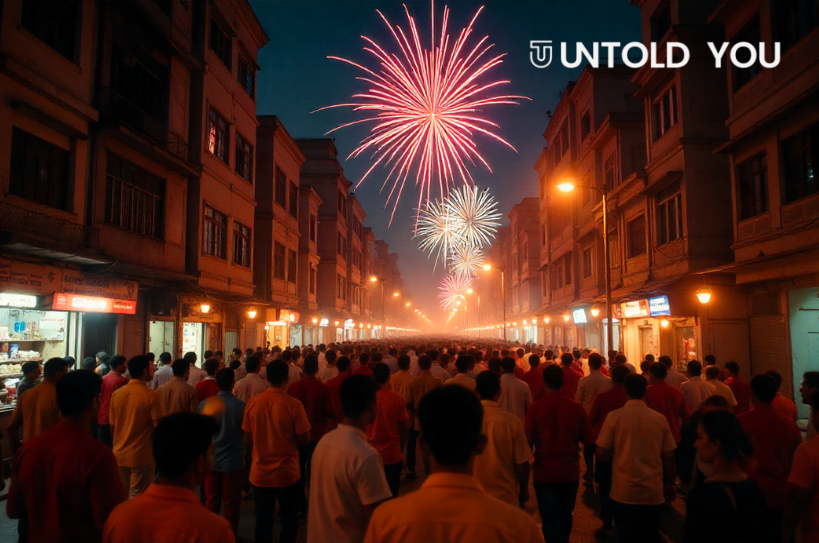India is a land of festivals—vivid, meaningful, and deeply rooted in myth, faith, and cultural diversity. Every festival in India carries a story that echoes through centuries of tradition. From the victory of good over evil to harvest celebrations and spiritual awakenings, these festivals offer a fascinating insight into the soul of the country.
Here are the Top 10 Indian festivals and the origins behind their celebrations, helping you understand not just how, but why these festivals are celebrated.
1. Diwali – Festival of Lights
Origin: The return of Lord Rama to Ayodhya after defeating Ravana, as per the Ramayana
Celebrates: Victory of good over evil, light over darkness
Traditions: Lighting diyas, bursting crackers, Lakshmi Puja, sweets
Know More: Incredible India – Diwali
Why It Matters: A pan-Indian celebration with regional variations
2. Holi – Festival of Colors
Origin: The burning of Holika, symbolizing the triumph of devotion (Prahlad) over evil
Celebrates: Joy, spring harvest, community bonding
Traditions: Throwing colors, singing, bhang, bonfires
Details: India Today – Holi Story
Tip: Mathura and Vrindavan offer the most traditional celebrations
3. Durga Puja – West Bengal’s Grandest Festival
Origin: Goddess Durga’s battle and victory over demon Mahishasura
Celebrates: Female power (Shakti), divine protection
Traditions: Idols, pandals, cultural programs, Dhunuchi dance
Read: Durga Puja UNESCO Listing
Unique Experience: Five days of cultural immersion
4. Ganesh Chaturthi – Birth of Lord Ganesha
Origin: The birth of Ganesha, son of Lord Shiva and Goddess Parvati
Celebrates: New beginnings, wisdom, and prosperity
Traditions: Installing clay idols, 10-day celebrations, Visarjan processions
Maharashtra Highlight: Ganesh Festival Mumbai
Eco Tip: Use clay idols for sustainable celebrations
5. Navratri – Nine Nights of Worship
Origin: Goddess Durga’s battle over nine nights with various forms
Celebrates: Power, protection, and womanhood
Traditions: Garba, fasting, temple visits, color-themed days
Explore: Navratri Significance – ISKCON
Variants: Celebrated as Golu in South India and Dussehra in the North
6. Raksha Bandhan – Bond of Protection
Origin: Draupadi tying a cloth to Krishna’s wrist; Indra’s wife Shachi tying rakhi to Indra
Celebrates: Sibling love and lifelong protection
Traditions: Sisters tie rakhi, brothers give gifts and vows
Culture Read: Raksha Bandhan Mythology – TOI
Modern Trend: Rakhi exchanges now transcend family to include friendships
7. Eid-ul-Fitr – End of Ramadan
Origin: Marks the end of the Islamic holy month of fasting, Ramadan
Celebrates: Charity, gratitude, brotherhood
Traditions: Offering prayers, giving zakat, sharing festive meals
Explore: About Eid – Muslim Aid India
Note: Moon sighting varies by region
8. Pongal – Tamil Harvest Festival
Origin: Sun god Surya is thanked for agricultural prosperity
Celebrates: Harvest season, family, and community
Traditions: Boiling milk and rice in clay pots, Kolam (rangoli), bullock races
Festival Details: Tamil Nadu Tourism – Pongal
Regional Variant: Celebrated as Makar Sankranti in North India
9. Baisakhi – Sikh New Year and Harvest Festival
Origin: Marks the formation of the Khalsa Panth by Guru Gobind Singh in 1699
Celebrates: Harvest and spiritual renewal
Traditions: Nagar kirtans, langars, folk dances like Bhangra and Gidda
Learn: SikhNet – Baisakhi
Best Celebrations: Punjab and Northern states
10. Onam – Kerala’s State Festival
Origin: Welcomes the mythical King Mahabali, believed to return each year
Celebrates: Prosperity, equality, and thanksgiving
Traditions: Pookalam (floral designs), Onasadya feast, Vallam Kali (boat races)
Visit: Kerala Tourism – Onam
Don’t Miss: Pulikali (tiger dance)
Why Understanding Origins Matters
- Deepens your cultural connection with the traditions
- Helps pass values and stories to the next generation
- Encourages respect for regional diversity
- Promotes ethical and meaningful celebration practices
Festival Travel Tips
- Book early for festivals like Diwali and Durga Puja
- Respect religious sentiments and dress codes
- Participate in local customs and rituals mindfully
- Use platforms like Incredible India to find dates and travel packages
Conclusion
Indian festivals are more than just holidays—they are living traditions, tied to epics, agricultural cycles, and spiritual principles. Whether you’re seeking joy, devotion, or cultural connection, each festival has a story that still matters today.
To explore more stories, travel guides, and cultural insights, visit Untold You—where India’s heritage is rediscovered one celebration at a time.



